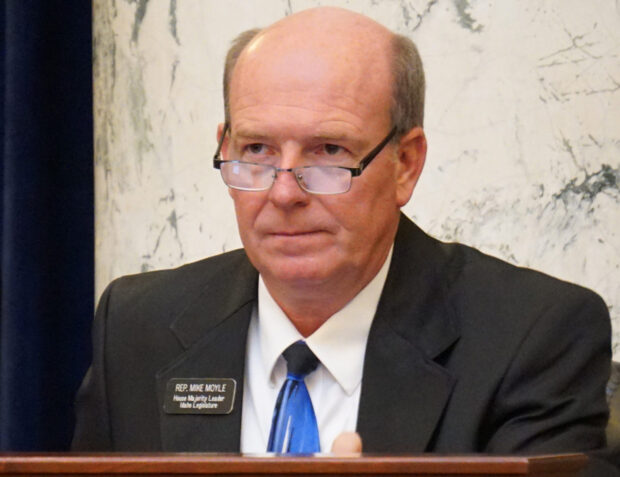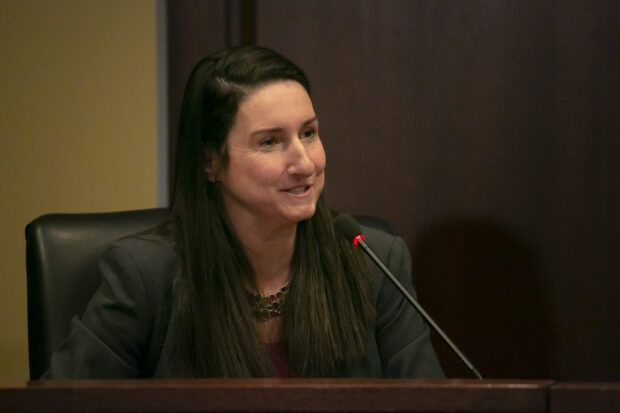Legislative budget-writers have saved their biggest work until the end.
On Thursday, the Joint Finance-Appropriations Committee will work up a higher education budget bill.
On Friday, JFAC will write up a series of budget bills for K-12.
Here, in the ninth week of the session, is where things get real. For college students worried about their tuition bill. For teachers and school bus drivers hoping for a pay raise. For parents hoping to have some help paying for a laptop, or possibly private school tuition.
Real-world impacts, and staggering numbers to match. Over the next two days, JFAC’s budget bills will shell out more than $2.8 billion of taxpayer money, or about 57% of next year’s state budget.
Of course, JFAC doesn’t get the final word. These budget bills have to pass both the House and the Senate in order to reach Gov. Brad Little’s desk. That means lawmakers will turn their attention to some big-ticket spending issues, and soon.
And in a legislative session that has been preoccupied with the checklist of culture wars — “harmful materials” in school libraries, sex education and school bathrooms and locker rooms — maybe it is time to get down to money matters.
To be fair, this session hasn’t been devoid of discussion on education finance.
The ongoing debate over education savings accounts — and school choice bills with pricetags ranging from $12 million to $45 million — is a debate about dollars, and if public money should go into nonpublic schools. But the debate has one foot in the K-12 culture wars. Some of the most fervent supporters of ESAs see the programs as a vehicle to allow parents to choose schools that better align with their values and beliefs.
And fittingly, Gov. Brad Little’s Idaho Launch proposal has ignited a heated debate about starting a new government program. Lawmakers are deeply split about whether to provide high school graduates with tens of millions of dollars of new money to pursue college or career training. It’s a big decision. It shouldn’t be an easy one.
But here’s the disconnect. While this is a Legislature divided on Idaho Launch — and the plan to earmark $80 million a year from a new in-demand careers fund — this Legislature has spent little time talking about how to spend $330 million a year in new K-12 money. Lawmakers said yes to the $330 million, and the $80 million, during their one-day session on Sept. 1. They gave Little the money, putting off the spending decisions until later.
“Later” comes this week, when JFAC writes the K-12 budgets.
Little’s plans for the $330 million would appear to have consensus support. He wants to put nearly $146 million into teacher pay, and $97 million into boosting salaries for classified employers, such as bus drivers, cafeteria and custodial staff — and over the past several years, legislators have been receptive to raises. Little wants $30 million to make the popular Empowering Parents education grants program a permanent fixture, which doesn’t appear to be too tough a sell.
Historically, higher education is another story. Higher ed budgets have run into trouble — especially on the House floor, as conservatives have pushed for cuts designed to stamp out diversity, equity and inclusion programs.
Already this session, lawmakers have shown a willingness to dig into granular higher ed spending issues.
- Three Republican legislators — JFAC’s House co-chair Wendy Horman of Idaho Falls; JFAC and Senate Education Committee member Scott Herndon of Sagle and Senate Education member Brian Lenney of Nampa — have continued to press Boise State University for hard-to-get details on campus speaking fees. Boise State said it spent $21,271 in state appropriations on speaking fees in 2022, according to emails Idaho Education News obtained through a public records request.
- Skepticism about higher ed spending has even extended to a separate — and, seemingly straightforward — $1 million budget bill to reimburse some costs stemming from the Nov. 13 slayings of four University of Idaho students. The bill did pass the House last week. But 14 Republicans voted no, with most of the opposition coming from North Idaho lawmakers.

House Speaker Mike Moyle didn’t want to speculate on the higher ed budget bill’s prospects on the House floor, until JFAC does its work.
“The devil’s in the details,” Moyle, R-Star, said during an Idaho Press Club legislative leaders’ luncheon Wednesday. “I don’t have an assessment of that until we know what the budget is.”
On the one hand, House Minority Leader Ilana Rubel is optimistic about budget season — because she likes what she sees from some of her first-year colleagues. “I think we have a batch of new legislators in there who truly understand the importance of public education, both at the K-12 and the higher education level.”
But the Boise Democrat isn’t completely satisfied. She isn’t happy that lawmakers have weighed through a series of ESA bills — including one that would siphon $12 million from the $30 million Empowering Parents program — before even starting to look at teacher pay raises or other K-12 programs. And she doesn’t want to see the K-12 or higher ed budgets “taken hostage” in a last-minute push for an ESA bill. “I’ve been very frustrated with the order of events here.”

JFAC is the one Statehouse committee with a very defined nonnegotiable work scope. These 20 lawmakers have to write 108 state agency budgets — which have to pass before the Legislature wraps up for the year.
“A lot of money’s going to get spent in the next two days,” Moyle said Wednesday. “And once that happens, you’ll see things start moving.”
For lawmakers — and anyone else who actually cares about such stuff — the education budgets are a linchpin for wrapping up the 2023 session. If these big budgets get through JFAC this week and make their way through both houses, lawmakers could actually finish up their work and meet their self-imposed March 24 target date for adjournment.
No objections here, for the record.
But for those who care about education policy, it could be said that the 2023 legislative session is just getting started.
Each week, Kevin Richert writes an analysis on education policy and education politics. Look for it every Thursday. Due to the timeliness of the topic, this week’s analysis was published on Wednesday, March 8.
Listen in: On a recent Kevin Richert Podcast, JFAC co-chairs Sen. C. Scott Grow and Rep. Wendy Horman break down the budget process.
